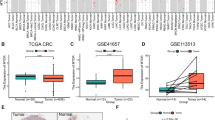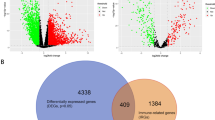Abstract
The identification of biomarkers correlated with colorectal cancer (CRC) prognosis holds substantial importance from both clinical and scientific perspectives. Zinc finger protein 26 (ZNF26) has not been previously investigated or documented in solid tumors; thus, further research is necessary to ascertain its prognostic value in CRC. Gene expression profiles and clinicopathological data were acquired from The Cancer Genome Atlas (TCGA) database. Subsequently, expression correlation was assessed utilizing the TCGA CRC cohort. The prognostic value of ZNF26 was evaluated through Kaplan–Meier (KM) and ROC curve analyses. Following this, Gene Ontology (GO) and Kyoto Encyclopedia of Genes and Genomes (KEGG) analyses were conducted to perform enrichment analysis between high- and low-ZNF26 expression groups. The association between immune cells, immune checkpoint genes, and ZNF26 expression levels was examined. Lastly, the research findings were further validated using CRC tissue samples. The results revealed that, in comparison to healthy controls, CRC significantly reduced ZNF26 expression. Elevated ZNF26 expression was associated with poorer overall survival in CRC patients. Additionally, high ZNF26 expression exhibited an inverse relationship with the immunological score and immune checkpoint gene expression in CRC patients. The findings from the TCGA data analysis were corroborated by the PCR results obtained from CRC tissue samples. ZNF26 is markedly upregulated in colorectal cancer tissues, potentially serving as a biomarker for CRC.







Similar content being viewed by others
Data availability
All data generated and analyzed during this study are included in this article and Supporting Information file.
References
Arenzana TL, Schjerven H, Smale ST (2015) Regulation of gene expression dynamics during developmental transitions by the Ikaros transcription factor. Genes Dev 29(17):1801–1816
Beato M, Eisfeld K (1997) Transcription factor access to chromatin. Nucleic Acids Res 25(18):3559–3563
Bray F, Ferlay J, Soerjomataram I, Siegel RL, Torre LA, Jemal A (2018) Global cancer statistics 2018: GLOBOCAN estimates of incidence and mortality worldwide for 36 cancers in 185 countries. CA Cancer J Clin 68(6):394–424
Cao JY, Wang X, Dai T, Wu YZ, Zhang MF, Cao RX et al (2018) Twist promotes tumor metastasis in basal-like breast cancer by transcriptionally upregulating ROR1. Theranostics 8(10):2739–2751
Daly ME (2017) Transcription factor defects causing platelet disorders. Blood Rev 31(1):1–10
Evelien D, Tanis PJ, Vleugels J, Kasi PM, Wallace MB (2020) Colorectal cancer. Lancet 394:1467–1480
Feng RM, Zong YN, Cao SM, Xu RH (2019) Current cancer situation in China: good or bad news from the 2018 Global Cancer Statistics? Cancer Commun 39(1):12
Guo L, Wang CL, Qiu X, Pu XY, Chang PY (2020) Colorectal cancer immune infiltrates: Significance in patient prognosis and immunotherapeutic efficacy. Front Immunol 11:1052
Huang QX, Shen ZY, Zang RJ, Fan XY, Yang L, Xue M (2018) Identification of novel genes and pathways in colorectal cancer exosomes: a bioinformatics study. Transl Cancer Res 7(3):651–658
Jen JY, Wang YC (2016) Zinc finger proteins in cancer progression. J Biomed Sci 23(1):53
Jen JY, Liu CY, Chen YT, Wu LT, Shieh YC, Lai WW et al (2019) Oncogenic zinc finger protein ZNF322A promotes stem cell-like properties in lung cancer through transcriptional suppression of c-Myc expression. Cell Death Differ 26(7):1283–1298
Jones S (2004) An overview of the basic helix-loop-helix proteins. Genome Biol 5(6):226
Krebs CJ, Zhang DQ, Yin L, Robins DM (2014) The KRAB zinc finger protein RSL1 modulates sex-biased gene expression in liver and adipose tissue to maintain metabolic homeostasis. Mol Cell Biol 34(2):221–232
Krishna SS, Majumdar I, Grishin NV (2003) Structural classification of zinc fingers. Nucleic Acids Res 31(2):532–550
Lai KP, Chen JW, He M, Ching AKK, Lau C, Lai PBS et al (2014) Overexpression of ZFX confers self-renewal and chemoresistance properties in hepatocellular carcinoma. Int J Cancer 135(8):1790–1799
Lander ES, Int Human Genome Sequencing C, Linton LM, Birren B, Nusbaum C, Zody MC, et al. (2001) Initial sequencing and analysis of the human genome. Nature. 409(6822):860–921.
Li Y, Tan BB, Zhao Q, Fan LQ, Wang D, Liu Y (2014) ZNF139 promotes tumor metastasis by increasing migration and invasion in human gastric cancer cells. Neoplasma 61(3):291–298
Li YJ, Yang Q, Guan HX, Shi BY, Ji MJ, Hou P (2018) ZNF677 suppresses akt phosphorylation and tumorigenesis in thyroid cancer. Cancer Res 78(18):5216–5228
Li XX, Han MZ, Zhang HW, Liu FR, Pan YL, Zhu JH et al (2022) Structures and biological functions of zinc finger proteins and their roles in hepatocellular carcinoma. Biomark Res 10(1):2
Liu JX, Li YM, Gan YQ, Xiao Q, Tian RT, Shu G et al (2021) Identification of ZNF26 as a prognostic biomarker in colorectal cancer by an integrated bioinformatic analysis. Front Cell Dev Biol 9:671211
Nguyen LH, Goel A, Chung DC (2020) Pathways of colorectal carcinogenesis. Gastroenterology 158(2):291–302
Scott MP, Tamkun JW, Hartzell GW (1989) The structure and function of the homeodomain. Biochim Biophys Acta 989(1):25–48
Sun YL, Zhao JX, Sun XR, Ma GX (2021) Identification of TNFAIP8 as an immune-related biomarker associated with tumorigenesis and prognosis in cutaneous melanoma patients. Front Genet 12:783672
Sun ZY, Dong JX, Song LJ, Li FQ, Wu X, Qiu ZD, et al. (2021) Network pharmacology validation of therapeutic mechanisms of tanshinone IIA in colorectal cancer. Nat Prod Commun. 16(3):1934578X211004271.
Wang JB, Jiang Y, Liang H, Li P, Xiao HJ, Ji J et al (2012) Attributable causes of cancer in China. Ann Oncol 23(11):2983–2989
Wolfe SA, Nekludova L, Pabo CO (2000) DNA recognition by Cys2His2 zinc finger proteins. Annu Rev Biophys Biomol Struct 29:183–212
Yang L, Hamilton SR, Sood A, Kuwai T, Ellis L, Sanguino A et al (2008) The previously undescribed ZKSCAN3 (ZNF306) is a novel “driver” of colorectal cancer progression. Cancer Res 68(11):4321–4330
Yoshihara K, Shahmoradgoli M, Martinez E, Vegesna R, Kim H, Torres-Garcia W et al (2013) Inferring tumour purity and stromal and immune cell admixture from expression data. Nat Commun 4:2612
Zhang J, Wen X, Liu N, Li YQ, Tang XR, Wang YQ et al (2017) Epigenetic mediated zinc finger protein 671 downregulation promotes cell proliferation and tumorigenicity in nasopharyngeal carcinoma by inhibiting cell cycle arrest. J Exp Clin Cancer Res 36(1):147
Funding
The work was supported by the Central Government Supports the Reform and Development of Local Colleges and Universities in Heilongjiang Province Undergraduate Colleges (High-Level Talent Project) (2020), project number: 2020GSP07; The Chinese Medicine Research Project of Heilongjiang (No. ZYW2022-119); "Double first-class" Discipline Development Fund of Heilongjiang University of Traditional Chinese Medicine (No. HLJSYL21003). The funders had no role in study design, data collection and analysis, decision to publish, or preparation of the manuscript.
Author information
Authors and Affiliations
Contributions
Conceptualization, Songjiang Liu; Data curation: Ye Liu, Lijia Zhang; Software, Ye Liu, Lijia Zhang, Heng Sun; Methodology: Xue Lei, Jun Yan; Writing-original draft: Ye Liu; Writing-review and editing: Ye Liu, Lijia Zhang, Xue Lei, Heng Sun, Jun Yan, Songjiang Liu. All authors have read and agreed to the published version of the manuscript.
Corresponding author
Ethics declarations
Ethics approval and consent to participate
This study was approved by the Ethics Committee of Heilongjiang University of Chinese Medicine (approval no. 2022102803). We certify that the study was performed in accordance.
Consent to participate
Not applicable.
Consent for publication
Not applicable.
Conflict of interest
The authors declare there is no conflict of interest.
Additional information
Communicated by Ewa Ziętkiewicz.
Publisher's Note
Springer Nature remains neutral with regard to jurisdictional claims in published maps and institutional affiliations.
Supplementary Information
Below is the link to the electronic supplementary material.
Rights and permissions
Springer Nature or its licensor (e.g. a society or other partner) holds exclusive rights to this article under a publishing agreement with the author(s) or other rightsholder(s); author self-archiving of the accepted manuscript version of this article is solely governed by the terms of such publishing agreement and applicable law.
About this article
Cite this article
Lei, X., Zhang, L., Liu, Y. et al. ZNF26-Associated Genes as Prognostic Signatures in Colorectal Cancer with Broad Therapeutic Implications. J Appl Genetics (2024). https://doi.org/10.1007/s13353-024-00854-3
Received:
Revised:
Accepted:
Published:
DOI: https://doi.org/10.1007/s13353-024-00854-3




